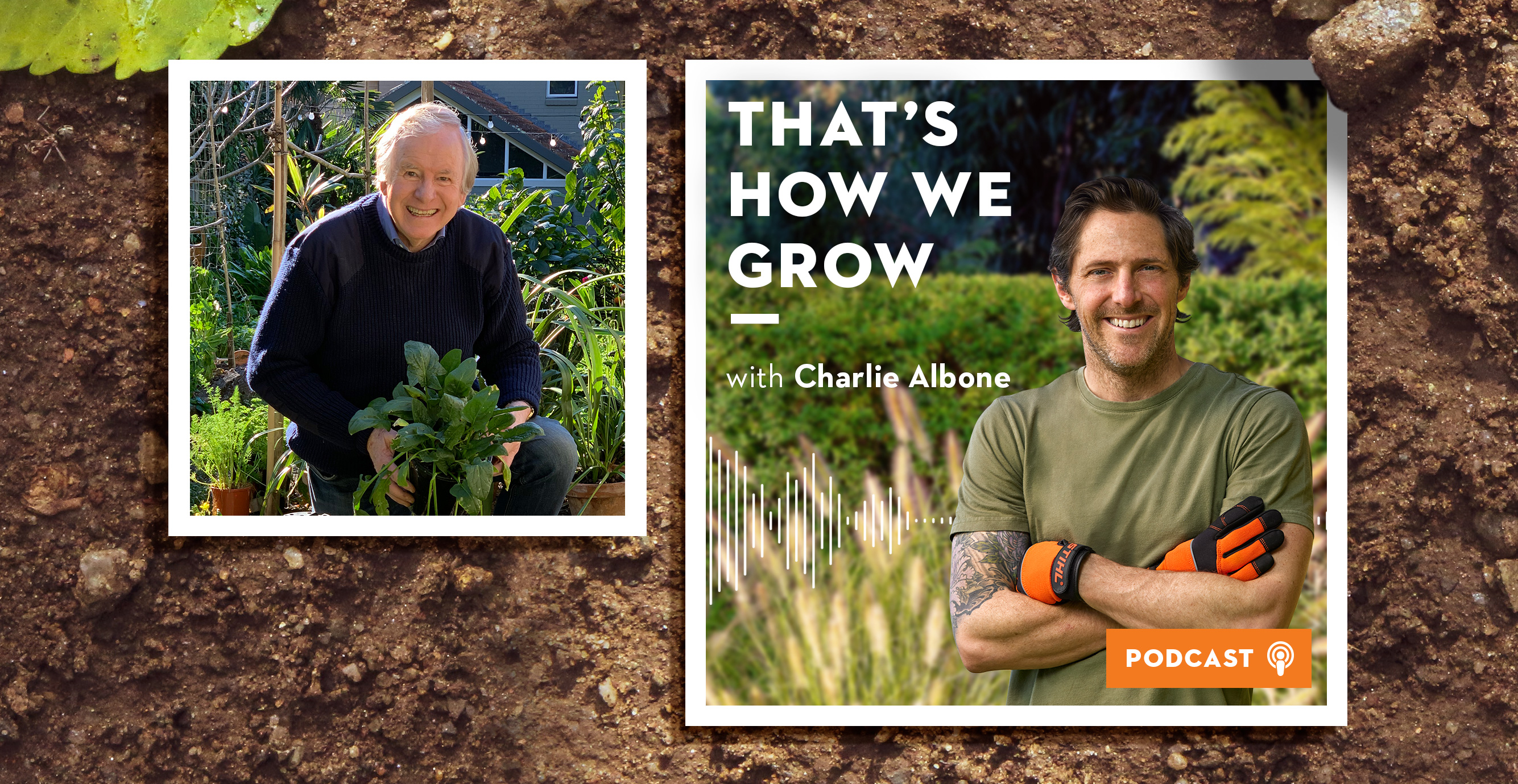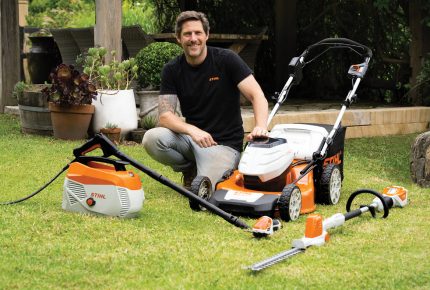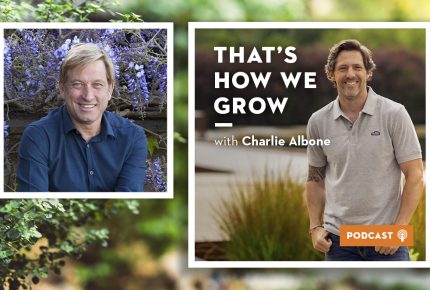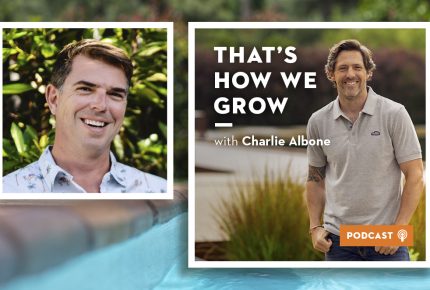
#Inspiration
Episode #1: Gardening Trends with Graham Ross
In episode #1 of STIHL’s gardening podcast ‘That’s How We Grow’, Charlie Albone and special guest Graham Ross, share what to look out for in the coming season and what inspiring trends they can see for 2021/22.
Episode #1 – Gardening Trends with Graham Ross Transcript
Charlie Albone:
Hi, I’m Charlie Albone, And welcome to episode one of That’s How We Grow, in partnership with STIHL garden power tools. Gardening for me is all about taking your time and enjoying it. The things that are ultimately the most rewarding are those that take your time, and for me, that’s my family and the garden. For many of us, gardening is an escape form and a real art form, and Australians are taking their gardens more and more seriously, and having the right tools plays an important part in that journey. Today, we’re starting a new project, a new challenge. We’re going to deep dive into the gardening landscape and then cover some of the latest developments all for you.
Charlie Albone:
On today’s episode, we’re talking to the legendary Graham Ross. He’s a mentor of mine, and I’m lucky to say he’s a good friend as well. I want to find out where does his love of gardening come from? How has he seen the landscape change over the years? What’s his favorite tool? Everyone wants to know what Big G’s favorite tool is. And what’s keeping the big man going in gardening? So let’s get stuck into it. Graham, what an absolute pleasure to have you. Do you want me to run through the list of all the amazing things you’ve done?
Graham Ross:
No, we’ll be here three days, Charlie.
Charlie Albone:
Okay. So you’ve been sharing your gardening knowledge on Australian TV for more than 40 years, correct?
Graham Ross:
Yes.
Charlie Albone:
When it comes to an international gardening pedigree, you’re basically an Academy Award winner, correct? Yes.
Graham Ross:
Well, maybe.
Charlie Albone:
In 2011, you were presented with London’s Royal Horticultural Society’s Veitch Memorial Medal in recognition of contribution to gardening and horticulture in Australia. Great.
Graham Ross:
It’s not only in Australia. And in fact on my wall over here. There you go.
Charlie Albone:
And you’re the only Australian in history to have been appointed a life fellow of the prestigious Royal Botanic Gardens in Kew.
Graham Ross:
Yeah, that was a real surprise and a huge honor.
Charlie Albone:
And you’ve been doing your radio show for a hundred years now, is that right?
Graham Ross:
Yes. I was there when they put the two wires together and yeah… 41 years it’s been. I think the trick is keeping under the radar. I think maybe they don’t know I’m there.
Charlie Albone:
Well, welcome to the show, and to kick it off, can you tell us how you got into gardening, because you’ve got a long history, don’t you?
Graham Ross:
I can remember planting sweet pea seeds with my dad. I was about four. Gardening to me was just automatic. It was like eating and breathing. And I gardened all my life, and eventually dad showed me how to do the lawns and get the lawn mower over and get us started and change the blades. And it wasn’t long before he said, “Well, it’s now yours.” He went off and played bowls my mother for the next 50 years. And I love pruning roses, I love doing the lawns, cutting the edges. He was a good trainer. He wasn’t a good gardener, but he didn’t train me well, I think.
Graham Ross:
I used to go to my local garden center regularly and I called on my bike on the way home from school, and all garden in those days had chain wire fences, so I put my bike up against the chain wire fence walked in and I said, “Oh, Mr. Stevens.” I said, “Is there any…” He said, “Yeah, seven o’clock Saturday morning.” He knew exactly what I wanted and I was 11 and I was there for 10 years. I left there when I was 21 to get married.
Charlie Albone:
What is it you love about it. What is it?
Graham Ross:
I love the plants. I love the flowers. I love the trees. And in those days before the big hardware stores, we sold spades and hoses and wheel barrows, seedlings. Lots and lots of vegetable seedlings. And packet seeds. And trees and shrubs and… Every winter, the bare rooted roses would come in and we’d heel them into trenches of sand. And then minutes later, all the flowering fruit trees would come in. Those would go into trenches, of course sand. And we’d sell them bare rooted. I loved all of that.
Charlie Albone:
If you were to look at gardening trends as such, what’s on the pulse at the moment, you would say.
Graham Ross:
We sold eight and a half million packets of seeds in one month in March, 2020. A lot of people had failures because they were growing tomatoes, because they went on the shelves and going into winter. We’ve got a lot of people we need to reeducate. There’s not a lot of stock around this year because a lot of people got into veggies and herbs. I think on a per capita basis, vegetables and herbs are enormous. What we did notice by the middle of the pandemic in 2020, flowers started to… People wanted a bit of color, and they wanted something that they could cut, because they were at home in lockdown. Then they thought, “Oh, I can buy a rose. Mum used to grow roses. I can buy a rose.” Now we noticed in 2021, fruit trees, because people want to grow an apple or a citrus.
Graham Ross:
So the trends do come and go, depending on pressures that are coming from society. And now we can buy a grafted citrus on a dwarf root stock. And that means that if you put it into a decent sized pot, you don’t actually ever have to re-pot it ever, because it’s on flying dragon dwarf root stock. Same full-size fruit, but a smaller tree. And grafted trees. There are a lot of trends that are happening with trees that are smaller, still great flowers, fruits, smaller trees, same size fruit. The quality of what we’re growing is improving. It’s like the tools. The quality of the tools we’re using is better. And it’s the quality of the plants that we’re growing are better.
Graham Ross:
If you asked my son or my daughter-in-law, they’d say, “Oh, Big G is using his favorite tool.” And the place is spotless. I am a bit neat, clean, and tidy. I weed into a bucket. I don’t weed onto the lawn and then pick it up. And everyone said, “Oh, he’s blowing again.” And then they, “Ah, looks neat.” So they whinge for 30 seconds, and then when it’s done they all love it. And my battery operated blower is brilliant. I couldn’t live without it. And the batteries are getting better, longer lasting, and it means that old cod just like me can keep gardening.
Charlie Albone:
Every weekend, Graham, the kids are onto me straight away. They’re, “Get your blower out, dad,” because they want a nice clean driveway. So I get the Stihl blower out. It takes no time to charge. I can’t seem to run a battery out before the next battery is charged up. So my kids and my wife are happy, because everything is spotless. The maintenance side of my business, we swapped over to battery a long time ago and the efficiencies are just fantastic. They really are great. I think people are spending so much more time in the garden at the moment. I mean, we’re forced to at the moment, but I think people are realizing what a sanctuary it can be and how healthy they want it to be. What do you get from your garden? Do you find it a sanctuary or is it something where there’s always jobs to do or…
Graham Ross:
It’s always been my life. It’s where I go to, and everyone in my family uses the garden too. It’s where we go to recreate. It’s where we go to work, sometimes together. I’ll be weeding and my wife Sandra will be putting in seedlings and fertilizer and compost and whatever. It’s where you can work together. You can work alone, and just as rewarding with you and nature and just interacting with the soil and worms. So there’s this interaction with nature that the garden does. And then there’s the other benefits where you put a bulb in the ground, which is just a little piece of dead wood, and you tend to it and look after it. I’ve just been planning liliums here at our office garden, and they’re only… I’m just thinking kids, but it’s not only children. It’s all of humanity, when you can see something that is lifeless and dead suddenly come to life and produce beauty like tulips and daffodils and hyacinths.
Charlie Albone:
The first thing I saw in gardening was a snakeskin fritillary, and that’s what really caught my imagination. It’s an amazing thing. You’re a very passionate gardener, but what sort of gardening is your favorite gardening? Is it trees? Is it shrubs? Is it vegetable? What is it?
Graham Ross:
It’s like what is your favorite music? My wife is classical. I love rock and roll. I was around with the Beatles. I was around before that because I loved dancing when I was young. I suppose if you said to me, “Sorry mate, Big G, you can only have one.” I would say, “Geez, Charlie.” And it would be trees. The tree house in our backyard where my mother used to live is underneath a 110 year old American pin oak, Quercus palustris. It has an 80 meter canopy. It is just the most spectacular thing. And my grandson, we’re training and educating him to look at the tree, hug the trunk, and identify all the different stages that it goes through from year to year to year.
Graham Ross:
It also provides me with all of the mulch that I need. I used to just use it straight away until prince Charles taught me that it was a waste of time putting leaves in the compost, so I now shred them. And I’m talking about about 400 orange garbage bags of leaves, but with kitchen scraps and prunings and cut grass, and you’re throw in a bit of a accelerator and some blood and bone, you end up with free soil. I’ve got three enormous compost bins. And I do love making compost. I love making compost.
Charlie Albone:
There’s something about making compost, isn’t there? I make a lot of leaf mold as well. I think raising seeds in leaf mold I found just got such a great success rate. When it comes to planning your gardening, gardening is not a reactive thing, is it? You shouldn’t be just going out and just saying, “I’m going to do this now.” You need to plan to make the most of it. Fertilizing an autumn for your spring push and all that sort of stuff. Have you got any tips on that?
Graham Ross:
I remember reading a survey from the Nursery Association maybe 35 years ago, and they did it… It shocked them, the results. It showed that 73% of plants that people buy die at the back door. And that’s because you’re going to see grandma or the auntie, or you go down the beach or whatever, and you’re coming home, you’re in the car, and you’re, “Oh, there’s a garden center. Let’s just pop in,” and you buy a few plants. “Oh, look at that. It’s in flower. Beautiful. Oh, love that red. Bright orange.” In the boot. You get home, the kids are screaming. And by the time you get into the house, you’ve forgotten. You took the plants, if you’re lucky, and put them at the back door. Some of them died in the boot, but 73% of the plants died at the back door.
Charlie Albone:
It’s a lot, isn’t it?
Graham Ross:
Yeah, it is. It’s wrong. And we can’t continue like that, gardeners can’t, and the associated nursery from the garden centers can’t. I remember Alan Newport telling me when I was working as a journo back in the 80s, and he was going… He’s passed away now, dear old sob, but he was going to California and I remember interviewing him at the airport. And I said, “Alan, what’s the big message that you…” And here I am telling you 40 years later. I said, “What’s the big message that you want to get across?” Because he was such a legend, Alan, and he brought so many high tech things into nursery production, plant production, seedlings, and great innovative creative thinker.
Graham Ross:
And he said, “Graham, if we allow home gardeners to blame themselves forever, we’re doomed. Success encourages success.” People for a while will think, “Oh, well that was my fault. The plant died, plant died. Must have been my fault.” Eventually they’ll think, “Oh, bugger this,” and they’ll go off and go caravanning or fishing.” And they’re the other two big hobbies in Australia. We’ve got to give them the information so that gardeners are successful in amongst their little failures. They’ll think, “Well that was good, that worked, those cabbages came up well.”
Charlie Albone:
You learn a lot from your mistakes as well as your successes, don’t you? I’ve been keeping a gardening diary, which I hardly ever go back to, to be honest with you. But I tend to write down what I’ve done during the day. And then if it’s successful, I’ll write down why it was successful. And just the process of writing it down has really helped me remember to do it again year after year. And that’s really what it comes down to.
Graham Ross:
A lot of people say… I’ve got a working knowledge of about, believe it or not, about 20 or 30,000 plants.
Charlie Albone:
You’ve got a photographic memory, it’s insane.
Graham Ross:
Yes, I have. I’m very lucky. I photograph, and Ray Rail told me to do this, my old mentor. He said, “When you photograph, and the old Nikon, click click, “When you photograph the plant, at the same time, you say its name.” Abelia grandiflora.
Charlie Albone:
And that’s how you remember them.
Graham Ross:
That’s how I remember.
Charlie Albone:
You’ve spoken to a lot of people on your radio show over the years. How have you noticed the gardening questions, how have they changed over the years? Are people more informed now?
Graham Ross:
I’ve answered 280,000 questions. I know the number because every question, every person’s name, the suburb and the question, I write down. When I mentioned this in an interview somewhere, the Mitchell Library contacted me and they said, “Can we have them?” And I said, “Yeah, of course you can.” But what has changed in 40 years or 280,000 questions? In some ways nothing’s changed. We still have a new generation of people. I’m on my third generation of people where people said, “My grandparents used to listen to it.” So that happens a lot. I’m just so privileged to have that relationship with people’s families. Yes, we still get the citrus question. Yes, we still get the grass question. Yes, we still get the rose question. All of those popular things are still popular today.
Graham Ross:
What hasn’t changed, Charlie is the fraternity. And it’s a global thing. You don’t need English. I remember when I went to China the very first time, which was ’82 I think, the streets were packed 24/7 because they were operating their factories all night in those days. And I remember leaving the Peace Hotel on the Bund in Shanghai, on the Huangpu river, and I went out and I just joined these crowds, they were just pouring on. It was 11 o’clock at night and the streets were empty. No vehicles, no pushbikes. And here on the side of the road on a step was a pot with an iceberg rose in it. And I still have my Nikon over my shoulder and I thought, “Oh, look at that.” So I had to wrench myself out of the crowd, being pushed along, and I edged myself back along the wall to take a photograph of this white iceberg rose.
Charlie Albone:
Did you say iceberg rose as you took it?
Graham Ross:
As I’m leaning down to take a photograph with my flash, the door opens and this lady sprays out Chinese at me. I do know two of the words, ’cause I remembered them and I’ve used them once or twice in the last 40 years in China, myself and I won’t be repeating them here. You know the ones I’m referring to.
Charlie Albone:
I know them. I know them well, yep.
Graham Ross:
But within half an hour, I was inside in the courtyard having tea with her at half past 11 at night. We had no English. I had no Chinese. But we were the closest of friends. I used to go and see her every year when I went back to China, and eventually, sadly, eventually she died. She had lived through the Cultural Revolution, she had lived through all these dramas, and she was growing this rose. I think it’s a great fraternity, and older people and younger people and children, kids at school. They discover that there’s three other kids in school who loved plants as well, and they’re the ones at the Garden Council. We’re chasing them, get them into gardening.
Charlie Albone:
You started gardening early on, and you mentioned back in the nursery, you’re working in all the tools that came in and things like that. It amazes me the progression in how tools have changed. You still can’t beat a good shovel, a good fork and a good set of secateurs. But I mean the power tool industry has just really moved on in leaps and bounds. I’m really happy to see people using battery power, and I think that’s what we need to get the younger generation into-
Graham Ross:
100%.
Charlie Albone:
We’ve known each other for a while, but we first really met in Chelsea 2015. You organized for Caitlyn Sawyer to come along and help out on the flower show that I built. And she was an amazing addition. And you obviously do stuff in the Garden Council and you’re really keen on getting the younger generation involved. Where does that come from?
Graham Ross:
I think we are a bit of a product of what my parents were. I think most of us are. Not all of us, but my mother in particular. My dad had a heart as big as Texas. Mum was always helpful like that. I learned that that was important thing to do. Being a gardener, at 15 years of age, when I arrived at college, I went to every event that was on. If there was a nursery opening or garden show, I went. And Jack Pike, Jack would give you advice. Allen Newport, Valerie Swain, and the people in Victoria, and the people in Queensland. Wherever I went in Australia as a teenager, the elders of my industry were friendly, helpful, and pass on knowledge. And I learnt an enormous amount from them.
Charlie Albone:
Graham, it has been an absolute pleasure chatting to you. The one thing that I think I’ve enjoyed the most is working out that gardening doesn’t have a trend. Gardening is a trend in itself. Gardening is gardening, and that is what’s amazing about it. It’s not a flash in the pan. It’s something that people who do it absolutely love, and let’s try and inspire more people to get into it. Absolutely.
Graham Ross:
Trends come and go, ideas come and go, flowers come and go. Roses seem to be popular. Native plants are huge. Trees are back en vogue. We’ve got an extra two and a half million people since March, 2020 that have joined the fraternity of gardeners in Australia. They need an enormous amount of our help. They don’t need to buy petrol gear, they can buy battery stuff. They can buy grafted eucalypts. They can buy great dwarf fruit trees. The revolution is the evolution of gardening, and it’s just getting better every year. I’ll probably live long enough to say it all happen.
Charlie Albone:
Absolutely. People are really loving gardening. They’re really getting into it. And I guess if you’re a newbie, it’s getting a little bit of knowledge, which really helps. There’s so many people out there that will help you. You’ve had people that have helped you along the way. Graham, thank you so much for your time. It’s been an absolute pleasure.
Graham Ross:
Mate. All the very best here, Charlie. I love you. Thank you, mate.
Charlie Albone:
Thanks, mate.
Community Questions
Charlie Albone:
So now it is time for me to answer some questions from the community, and Robin in Melbourne asks, “I’m never too short where to start with my spring tidy up. What needs to be done and when, and does it matter?” Now when you’re tackling a big job like a spring tidy up, you want to run it like a bull in a China shop. You just want to try and do everything. But if you’re systematic about it, you can really make your time in the garden more effective, which means you get more time at the end of the day to enjoy the fruits of your labor.
Charlie Albone:
So I always start at the top and work down. And by that, I mean deal with your trees first, because you’re going to be causing debris coming from them. Then start on your larger hedges and then move to your smaller hedges. That way any of the clippings move towards the ground and finish off on the ground level. So finish with the lawn and then clean all your paths, blow your paths off. But if you want even more tips about a spring tidy up, you could read my blog on the Stihl website, which is stihl.com.au/Blog.
Charlie Albone:
Georgia from the Sunshine Coast asks, “I’ve recently moved to the Sunshine Coast from Melbourne. With the winters not being as cold, will my garden be growing all year round, or will it get a break in winter? Do I need to plan my gardening calendar differently?” Well, lucky you living on the Sunshine Coast. What a delightful climate to be working in. Gardening for you is going to be a year round process. It’s going to slow down slightly in winter and in summer, actually, the heat might be a little bit stifling. So spring and autumn are going to be the busiest for you, but you need to keep working all year round.
Charlie Albone:
Which for me, that sounds ideal. I mean, it’s perfect. With your gardening calendar, yes, you just need to take into account that your plants are going to be growing all year round, so they’re going to need more fertilizing, they’re going to need more watering. So just keep an eye on it and keep a gardening calendar. So keep a journal of what you’ve done so when you go back the year after, you can see what you did and then alter it or keep it the same.
Charlie Albone:
Nathan from Melbourne is asking, “When and how often should I trim my hedges? And are there any times of the year this should be avoided?” So when you’re pruning a plant, you need to remember when you prune it, it actually promotes more growth. So the more you prune a hedge, the denser it’s going to be. Are there any times of the year that it should be avoided? Well, you don’t really want to be pruning in the middle of summer, and if you do it in the middle of winter, well, it’s not going to grow much more either. So I like to do it when the weather is nice and cool. Spring and autumn is perfect. But if you’ve got a shaggy looking hedge, it needs a prune. If you’re doing it in the middle of summer, you might want to put a sheet over the hedge just to protect the new growth until it hardens off just for a couple of hours or so.
Charlie Albone:
Matt from Sydney is asking, “I’ve been thinking of relaying my lawn. When is the best time to lay new grass?” Well, you can lay grass all throughout the year. If you do it in winter, just don’t step on it, because it’s going to take ages to establish. And if you do it in the heat of summer, you’re going to have to pump a lot of water into it to keep it alive, remembering you’re just laying a small sod of earth and that’s going to dry out quickly. So again, the best time is in spring and in autumn.
Charlie Albone:
Next week on the podcast we have Joe Rogers from Lawn Solutions Australia, and he’s going to be a special guest to talk all things lawn so we can cover that off then. Do you have any gardening questions you’d like me to answer? Well, send me an email at charlie@stihl.com.au. I’m looking forward to getting your questions. In our next episode, I’ll be joined by Joe Rogers from Lawn Solutions Australia. Maintaining an immaculate lawn can be a year round challenge, but when mastered correctly, your neighbors are going to be sure to take notice. Joe and I are going to lift the lid on lawn care on how to best keep everything green.
CONCLUSION
Charlie Albone:
So that wraps up our first episode of the podcast. And what did we learn? Well, we learned that gardening is more popular than ever. People are interested in vegetables and flowers because it’s an amazing thing to do, and just bringing a bit of color to your life just makes it so much better. We found out that gardening might not be a trend. It has things that come and go, but overall, just being part of gardening is a great thing because it connects generations and communities together. And we found that times are changing as well, there is a movement towards battery power because it’s better for the environment, it’s quieter, it’s more powerful, but make sure you go with a trusted good quality brand like STIHL.
Charlie Albone:
Need the tools to take on any gardening challenge, or perhaps you want to learn more about battery power by Stihl? Go to stihl.com.au or head to your local STIHL dealer today. Follow STIHL on Instagram @stihl_au. That’s S-T-I-H-L underscore A-U. And follow me on Instagram as well, Charlie_ Albone. And don’t forget to check out Stihl’s blog with plenty of great gardening advice, tips, and tricks. stihl.com.au/blog. We have plenty more in store for you. If you haven’t already, make sure you like and subscribe to the podcast to keep up to date. Thanks for listening.
Listen to the audio recording of this podcast here.






